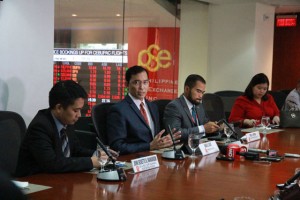PSEi tumbles 7% in China-led global market rout before cutting losses to 6.7% at the close
Sentiment-driven sessions on the Philippine Stock Exchange (PSE) gave way to panic among investors who found no other direction to follow on Monday after seeing massive Shanghai-led slides in equities markets around the world.
Analysts said the huge drop indicated growing fear about the repercussions of a sustained weakening of the yuan, or renminbi.
“The drop is sentiment-driven, given the uncertainty brought about by the weak Chinese currency, which is causing concern globally,” Astro del Castillo, managing director at First Grade Finance Inc., said in a phone interview during trading.
Investors from bigger bourses overseas have shown disappointment over China’s lack of effective state intervention to arrest the decline in its own markets, which continued to drag global stocks with a further 8.8 percent fall in Shanghai’s blue-chip CSI300 index on Monday, after last week’s 11 percent tumble in its main market indexes.
In Manila, the benchmark PSE index plummeted by more than 7 percent at around mid-afternoon before closing down 6.7 percent or 487.97 points at 6,791.01.
Monday’s fall was the steepest since the index slid 6.75 percent on June 13, 2013. It also marks the index’s return to the 6,700-point territory since it last touched the level on June 24 last year.
The broader All Shares index lost 6.06 percent or 251.99 points at 3,906.13.
“Sentiment is very bad. We’re just mimicking the foreign market,” del Castillo said.
“We don’t see any factors strong enough to pull the market back up [right now]. Investors are very apprehensive on what to look for, especially since the second-quarter earnings results are relatively low,” he added.
BDO Chief Market Strategist Jonathan Ravelas saw the market weighed down by poor sentiment amid a slew of negative factors.
“Market players were emotional as they digested the weakness in the US markets and negative data from China, causing the local currency and stock market to slide to new lows.”
Bryan Gomez, co-head of investments at Citisecurities Inc., said Monday’s selloff as a spillover from overseas markets.
“No market was spared from the uncertainty injected by the renminbi’s devaluation. We are currently seeing the manifestation of that right now and its full magnitude has yet to be established. Until then, it is better to stand aside and not attempt to ‘catch the falling knife’,” Gomez said.
“Investors need to be patient in waiting for the volatility to die down. With full confidence, I can say this, too, shall pass and opportunities will emerge again,” he added.
Del Castillo said a positive factor from Monday’s session is the possible “window for accumulation” that could open up tomorrow or the day after. He warned, however, that the rebound would be tempered by continuing uncertainty over the Chinese currency’s impact on global markets.
All sectors fell during Monday’s trade, with not one losing less than 4 percent. The mining and oil sector posted the biggest loss of 8.85 percent.
The most actively traded stocks slid, registering losses of between 4 percent and more than 10 percent.
The volume of shares traded totaled 2.369 billion, valued at P13.033 billion. Decliners outnumbered advancers 212 to 13, while 20 issues closed unchanged.
Monday’s losses wiped out all gains accumulated over the first quarter of the year, which had raised the main index to a high of 8,100 points from 7,200 on the last trading day of 2014. In the year to date, the benchmark stock index had fallen 6.1 percent.
PSE President Hans Sicat told reporters in a briefing on Monday the sharpest drop in the history of the local stock market occurred during the Asean financial crisis in 2008, when the PSEi plunged 12.27 percent on October 27. Total market capitalization of the listed companies shrank by P764.44 billion on Monday to P13.37 trillion.
The PSE president said the market experienced “a massive one-day drop” mainly on the devaluation of the Chinese yuan, and also due to other factors such as global volatility fueled by uncertainty ahead of an expected interest rate hike by the US Federal Reserve, seen likely in September.
“What happened in Philippine market today was that the pressure was felt in the global markets, dragging not just the equity asset class, but all the asset classes . . . In the last few weeks, the market has been defensive… I think short-term volatility is quite high,” Sicat said.
He added it was too early to tell whether the market has entered bear territory.
“It is too early to tell. There’s a little bit of disconnect with some fundamentals,” Sicat said.
“We are still one of the least affected by the Chinese yuan devaluation, compared with our peers because of the Philippines’ strong fundamentals.”
“The view is that the economy continues to grow due to pressures of increased spending on infrastructure program. There is also a wide base of young and active workers and consumers in the country. The selloff in the market just created openings to buy and come into the market,” he added.


